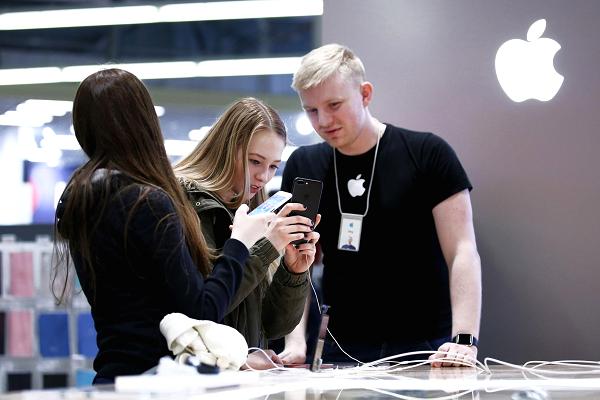 price forecasts. And that’s after a slew of analysts have already inched their targets higher for Apple.
price forecasts. And that’s after a slew of analysts have already inched their targets higher for Apple.
Of the big five tech stocks, Apple’s implied return — that is, the average difference between analysts’ target prices and the stock’s current price — is lowest.
At $146 apiece, shares of Apple’s stock now have a higher price tag than ever, adjusted for a 2014 stock split. Yet Wall Street recommends that investors continue to shell out ever-higher prices for the stock.
Seventy-seven percent of analysts in FactSet recommend buying Apple shares, even as the price per share gets within 5 percent of their May target of $153.86 a share. Twenty-three percent recommend holding the stock — and not a single analyst recommends cashing out and selling the stock, even at its all-time high.
Apple has had all “hold” and “buy” ratings consistently since February, when the stock began hitting all-time highs, according to FactSet.
Other technology companies, such as Alphabet, Facebook, Amazonand Microsoft, have also been near all-time highs this year. But of those companies, Amazon is the only other company without a single “sell” rating in FactSet — and all four have higher implied return than Apple.
Indeed, between Apple’s all-time highs in mid-February and the end of its March quarter, analysts listed in FactSet have upped Apple’s stock price 25 times — more than twice as often as other big tech names. (Since Microsoft, Alphabet and Amazon reported earnings last week, and Facebook had a developer event in April, they’ve seen a slew of new ratings.)
Implied return over the next 12 months
- Amazon: 13.4 percent
- Alphabet: 11.5 percent
- Microsoft: 6.6 percent
- Facebook: 6.0 percent
- Apple: 5.2 percent
Source: FactSet
Price target increases between mid-February and the end of March
- Amazon: 5
- Alphabet: 10
- Microsoft: 5
- Facebook: 11
- Apple: 25
Source: FactSet
“It can almost do no wrong”
Apple’s earnings report on Tuesday isn’t expected to be especially stellar — Apple analyst-turned-venture capitalist Gene Munster called the earnings a “non-event.” Yet the stock has gotten lots of love in financial markets — highlighting the “disjointed” relationship between how consumers and analysts view the stock.
“It can almost do no wrong. 2016 wasn’t great for Apple earnings, but you rarely see it get punished,” said Christine Short, director of media and public relations at Estimize.
“It certainly doesn’t get treated like Facebook, if they miss their [monthly active user estimates]. Analysts are hesitant to put a cap on Apple’s growth. …There has been so much made out of the iPhone 8, no one is really willing to go out on a limb.”
Estimize is a crowdsourced financial data platform that aggregates fundamental estimates from independent industry watchers, academics, and buy-side and sell-side analysts. Short said that on Estimize’s platform, non-professionals — especially business students — tend to give the most accurate estimates for Apple earnings.
“Even as Apple approaches its target prices, analysts are willing to shift it higher. We all know that there’s not an equal amount of buys and sells out there — the system is kind of disjointed,” Short said.
Short attributes the track record of nonprofessionals to the fact that younger students know the iPhone intimately — and that sell-side analysts face pressure from the companies themselves to keep the relationships open. The nonprofessional half of estimators also tend to give fewer estimates, she said.
“Sell-side analysts, they cover 30 to 50 stocks,” Short said. “They can’t intimately know 30 to 50 names. [Nonprofessionals] are only picking the ones they feel good on.”
Dan Ives, formerly a top Apple analyst, said Apple is indeed a special stock at the moment, thanks to building anticipation for the next iPhone, to be released later this year.
“If you look at the industry, this has been one of the most anticipated product releases in years,” said Ives, who is now a senior vice president at mobile technology firm Synchronoss. “I think when you look at Apple and the ecosystem, going into the iPhone 8 potential supercycle, there’s obviously a lot of positive thoughts across the board going into this release.”
Ives said that Apple has earned its reputation as the “gold standard” tech stock, noting that the iPhone “helped change modern society.”
“They have a consumer ecosystem and a following that’s really unique to any technology company,” Ives said. “You’ve seen it go from parabolic growth to more mature growth, but you’re going to continue to have innovation. There’s more competition, but Apple continues to up the game, which has really been their trait.”
Short also noted that analysts also view stock values using metrics other than price, such as price-to-earnings ratio. By some of those measures, Apple’s earnings or share price aren’t as crucial, Short said. She also noted that by far the best estimate on Estimize for Apple earnings combines both Wall Street pros and average consumers.
“It’s pretty remarkable. This is a name, regardless of how they report, they tend to trend upwards if you hold [the stock],” Short said. “There’s a feeling of, ‘Get in quick before you miss the upside.’ It’s hard to spin a bad Apple report. They only have more cash than any other public company. I think they are going to offset last year with a great 2017.”
Watch: Time to bet on Apple?






